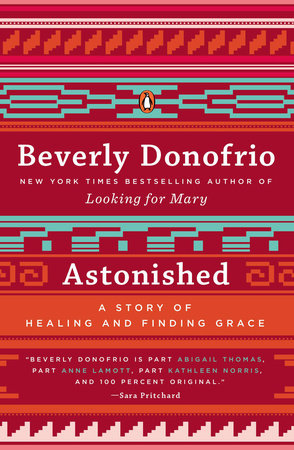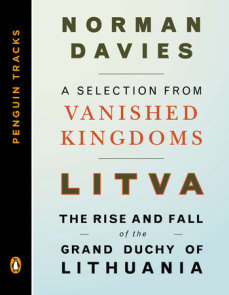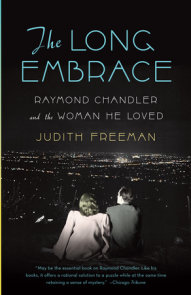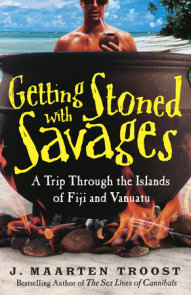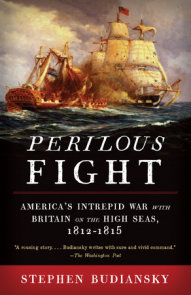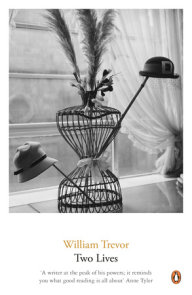READERS GUIDE
Questions and Topics for Discussion
INTRODUCTION
On a quiet summer night, author Beverly Donofrio is wakened by a man with a knife, a man, she realizes, who is the serial rapist who has been terrorizing her Mexican town. Astonished is the true story of how, terrified and shaken to her core, Donofrio turns to her faith in God to transcend her ordeal, forgive her offender, and find deeper meaning in life.
Donofrio—the successful author of the bestselling memoir, Riding in Cars with Boys, and the memoir of spiritual awakening,Looking for Mary—was enjoying a pleasant expatriate life in San Miguel de Allende. Until the time when yoga in the mornings, dinners with friends, parties and mariachis left her feeling inexplicably empty and lost. Before her rape, a visit to a monastery prompted a desire for a life of solitude and contemplation. After she’s raped, Donofrio leaves her Mexican home and retreats to monasteries and houses of prayer across the United States and eventually settles into a Carmelite hermitage high up in the Colorado mountains. Immersing herself in spiritual practices and readings, she discovers what it means to have an intimate and meaningful relationship with God.
Informed by her wide–ranging studies, Astonished is a fluid and conversational narrative, casual in tone, deeply emotional, intelligent, and refreshingly funny. Donofrio revisits events from her childhood and moves easily between the personal and the theological, drawing clear and often surprising links between the two. Yet Donofrio is not dogmatic in her beliefs; she struggles to balance Catholic doctrine with her political principles and her private experiences. She explores issues large and small, at one moment struggling to understand why evil exists, at another asking Jesus to grant her the patience to deal with dinner guests who’ve overstayed their welcome. At the heart of her spiritual journey are her rape and the nightmares, anxiety, and terror it triggered. How can she love a God who allows evil—so much pain and havoc and loss—tornadoes, tsunamis? How can she absorb this horrific experience and become a stronger person, a more devoted Christian, a better mother and daughter?
Ranging from Mexico to the Sangre de Christo mountains of Colorado to Donofrio’s childhood home in Connecticut,Astonished is an ambitious journal of four years of struggle and solace, redemption and renewal. With her sharp wit and tough honesty, Donofrio exposes the most intimate details of her quest for grace and understanding, and she shares bravely with her readers, encouraging them to question her beliefs and behaviors — as well as their own.
ABOUT BEVERLY DONOFRIO
Beverly Donofrio’s first memoir, Riding in Cars with Boys, has been translated into sixteen languages and was adapted into a feature film. In addition to a second memoir, Looking for Mary, she has also written a picture book, a children’s novel, and numerous essays for publications such as O, The Oprah Magazine,The New York Times, and the Washington Post. She currently teaches at the low–residency MFA program at Wilkes University.
A CONVERSATION WITH BEVERLY DONOFRIO
Writing a memoir requires an author to reveal herself completely to her audience. What drives you to share the intimate details of your life with the public?
My mother said, “Don’t hang out your dirty laundry for everyone else to see.” It’s true that dirty laundry does not make a pleasant sight, but everyone does have dirty laundry, things they are ashamed of, pain, loss, missteps. It’s part of life. When I get to know someone, I want to hear the real stuff, the down and dirty, and that’s what I like to tell. In my books I say, Look, this is how it is, the truth as I see it. Memoir, like all good writing, is about getting to the truth, particularly the emotional truth. I believe that finding mine—what is available according to my emotional development at the time—and then telling it will encourage others to discover and embrace theirs. That kind of excavation is illuminative and it’s healing, for the teller, the listener or reader, and the world.
The Catholic Church has, for many years now, been beset by scandals, primarily of a sexual nature. With this reputation foremost in people’s minds, do you find yourself forced into a position of defending the Church to others?
I don’t defend the Catholic Church. It’s indefensible. What I do say is that if the church is going to change it’s going to change from within, through the laity—and the nuns. I remain a Catholic, although I only go to mass if I know the priest is good—and there are good, passionate, warm–hearted priests.
Much of your personal practice—meditation, acts of kindness, harmony with nature—can also be found in other religions and philosophies. Do you feel that, ultimately, all belief systems have the same goal?
Yes. And the goal is quite simple if not easy: To love.
How could a reader apply the lessons of your experience to their own life?
The important question when difficult or traumatic things happen to you is not why but what are you going to do? We are not in control. You can be sitting in your living room watching TV one moment and the next the earth opens up and you fall into a sinkhole. You can be having your morning coffee and hear on the news that a plane just flew into the World Trade Center where your husband and aunt are working. The only thing we have control over is how we respond when something horrifying or tragic happens. Feeling like a victim, seeing yourself that way, takes away your power. Feel sadness and anger and grief. But don’t feel sorry for yourself, ever. Well, you may not be able to help it, at first, but don’t indulge yourself. We have no idea what good, what learning and growth the loss, or upset is going to bring. Suffering in one person can provide grace for another. Nothing is good or bad, as Hamlet said, but thinking makes it so. We must forgive life for being life, or we will be bitter and afraid. The greatest learning for me through this entire journey has been to accept What Is, not what could or would or should be but what is. And to try to make no judgment about it.
Or maybe the greatest learning is this: The purpose of a spiritual life is to make life significant, and sacred and full of meaning.
Or maybe the greatest learning is this: God loves you as much as you allow God to.
Or maybe it’s this: God is right here, right now; we just have to recognize Him/Her/It.
Now that you are no longer a member of a monastic community, how does your practice as a lay Carmelite manifest itself in your life?
I think of my time in the monasteries as spiritual boot camp. I am now well practiced in spiritual disciplines, and it hardly takes any will to maintain them, because when I don’t—because of travel, say—I miss them as much as ice cream in summer. I do believe as some wise person said, “The spiritual life is to be worked at, not hoped for.” This is my morning: I get up, make coffee, and read spiritual books. Right now I’m reading Thich Naht Hanh, a Buddhist monk; Hafiz, a Sufi poet; Evelyn Underhills’ Mysticism; and a book of short essays, Grace’s Window, by Suzanne Guthrie, an Episcopal priest. I finish with a chapter of the New Testament then I pray the morning office. I eat breakfast while watching the birds at the feeder or the ocean out my window. Then I meditate for a half hour, and end with up to an hour of Yoga. I am extremely fortunate and grateful to have the time to do this. It takes at least three hours. Then I write. Weather permitting in the late afternoon I take a walk. It’s important to get out doors, smell the smells, be with trees, feel the air, and the sun whenever it appears, which in the northeast is not all that often.
I think that the Good News is that we are called to be Christ and to see Christ in everyone—some call it our higher selves. I’m not so good at doing this yet but I have hope. I smile a lot. I laugh as much as I can, especially at myself.
You end the book with a list of what you hope to accomplish in your “new life” after selling your home in Mexico. How many of these plans have come to fruition, and what other things have you been doing since you finished Astonished?
I did sell my house and buy a car with the proceeds, but I’ve yet to buy another house. I’m renting on the North Fork of Long Island, two hours from my grandkids in Brooklyn and a ferry ride to my father in Connecticut. My mother died eight months ago. It was very sad and I miss her every day. She died with her family gathered around and is no longer struggling for every breath. I try to visit my father at least once a month and make him a lemon merengue pie, his favorite. My granddaughter, Audrey, and I bake cupcakes. Zachary likes as much butter on his popcorn as I do; the last movie we watched together was Cars II. Summers, I plant vegetables in my garden. There is no line dancing on Long Island, at least that I can find, but I’m about to visit a friend in Houston and I’m bringing my cowboy boots. I bought a hula hoop that’s gathering dust. I have joined the twenty–first century: I own an iPhone, am on Facebook and Twitter. I’ve given up Netflix for Lent. I have been back to Nada, twice. And as I write this, I am heading off in a few days for the book tour to launch the hardcover version of this book. The monks will meet me in Denver. I can’t wait.
DISCUSSION QUESTIONS









